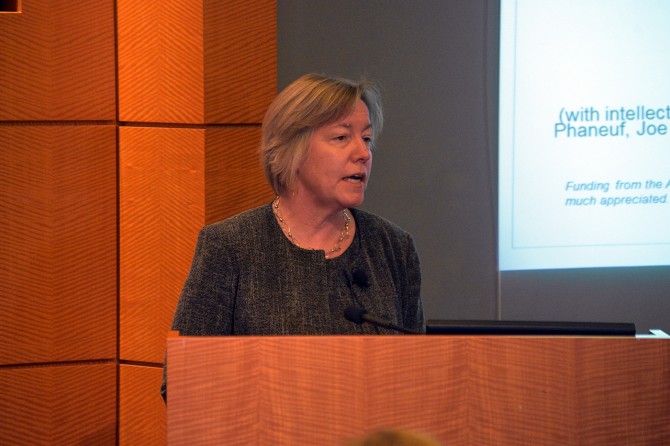Kling explores social cost of water pollution at D.C. event
By Rachel Rhodes
Water pollution causes damage to health, recreation, industry and infrastructure, but can be addressed through policy informed by measurement of its costs to society, said Atkinson Center for a Sustainable Future faculty director and water policy expert Catherine Kling.
Kling, a Tisch University Professor in Cornell’s Dyson School of Applied Economics and Management, spoke about her research on measuring the societal costs of water pollution at an event co-hosted by the Atkinson Center and Resources for the Future (RFF) in Washington, D.C., Dec. 4.
Kling, a university fellow with RFF, began by presenting the enormity of the water pollution problem and the challenge of measuring its costs to society. “First of all, there are health concerns with water quality,” she said. “There is a clear economic cost to making water clean enough to drink, but there are also costs associated with health risks to those who drink untreated water and there may be residual risk from treated water.”
Other costs attributed to water pollution include damage to recreational spaces, environment and wildlife, industry, infrastructure and nonuse value – the inherent value of water quality to wildlife and ecoystems.
“We haven’t as a community conceptually thought about trying to come up with a set of numbers that can be used to inform policy and get people thinking about how to measure the various pieces of water pollution and its cost, analogous to the structure of the social cost of carbon,” Kling said.
Efforts have been made, Kling noted, to study water pollution and measure the costs and benefits of federal programs related to the Clean Water Act of 1972. Such studies include assessments of the controversial Waters of the United States rule and the Conservation Reserve Program administered by the U.S. Department of Agriculture.
“Here is what is striking about these studies: the benefit-to-cost ratio in almost all of them is less than one, showing that the benefits of these programs do not exceed the costs,” she said. “As researchers, we wondered, are these numbers accurate which suggests we are spending too much on cleanup, or are these studies biased in ways that lead to that outcome?”
In examining these studies, she found that most were limited by the availability of data, use of outdated methodology or an incomplete set of benefits. In particular, the nonuse value benefits of water quality were omitted in all of the models, which Kling said may paint the wrong picture of water quality regulation.
“To do better for society, we need to develop the social cost of water and model the pathways of pollution. What rivers does it flow through? What groundwater does it touch? Would there be any air emission and where would it go? What are the ecosystem impacts at the end of that? Would it impact fisheries or drinking water? Then we need to monetize the impacts in an integrated assessment model,” Kling said.
Kling emphasized the need to engage with policy makers and practioners in developing an integrated assessment model for measuring the cost of water pollution, including in her research at the Atkinson Center. “What scale and level of precision is useful to policymakers?” she asked. “We can come up with the numbers, but want to make sure resources can be directed where they are most effective.”
Rachel Rhodes is a public affairs and media relations specialist in Cornell’s Washington, D.C., office.
Media Contact
Get Cornell news delivered right to your inbox.
Subscribe

